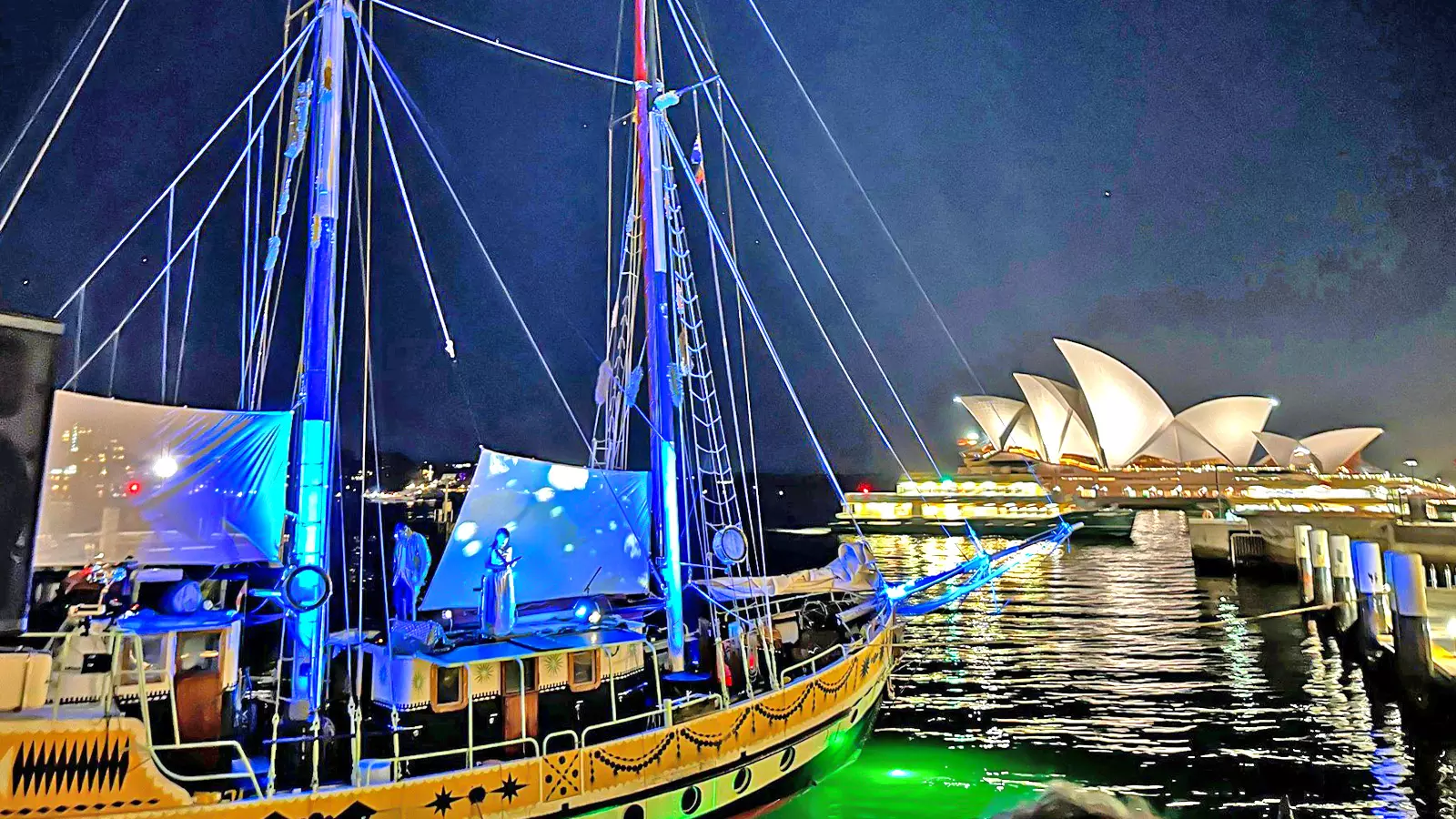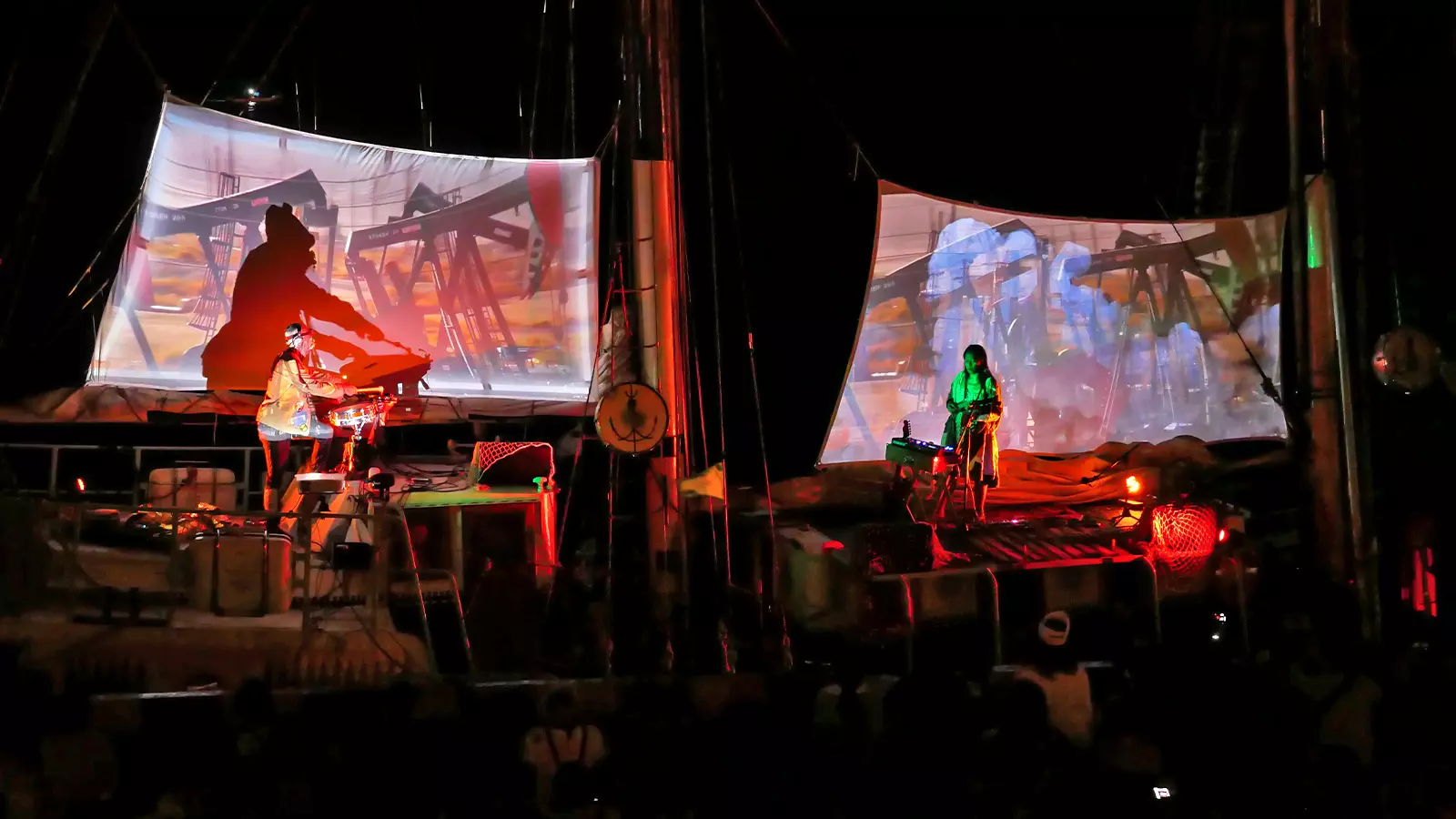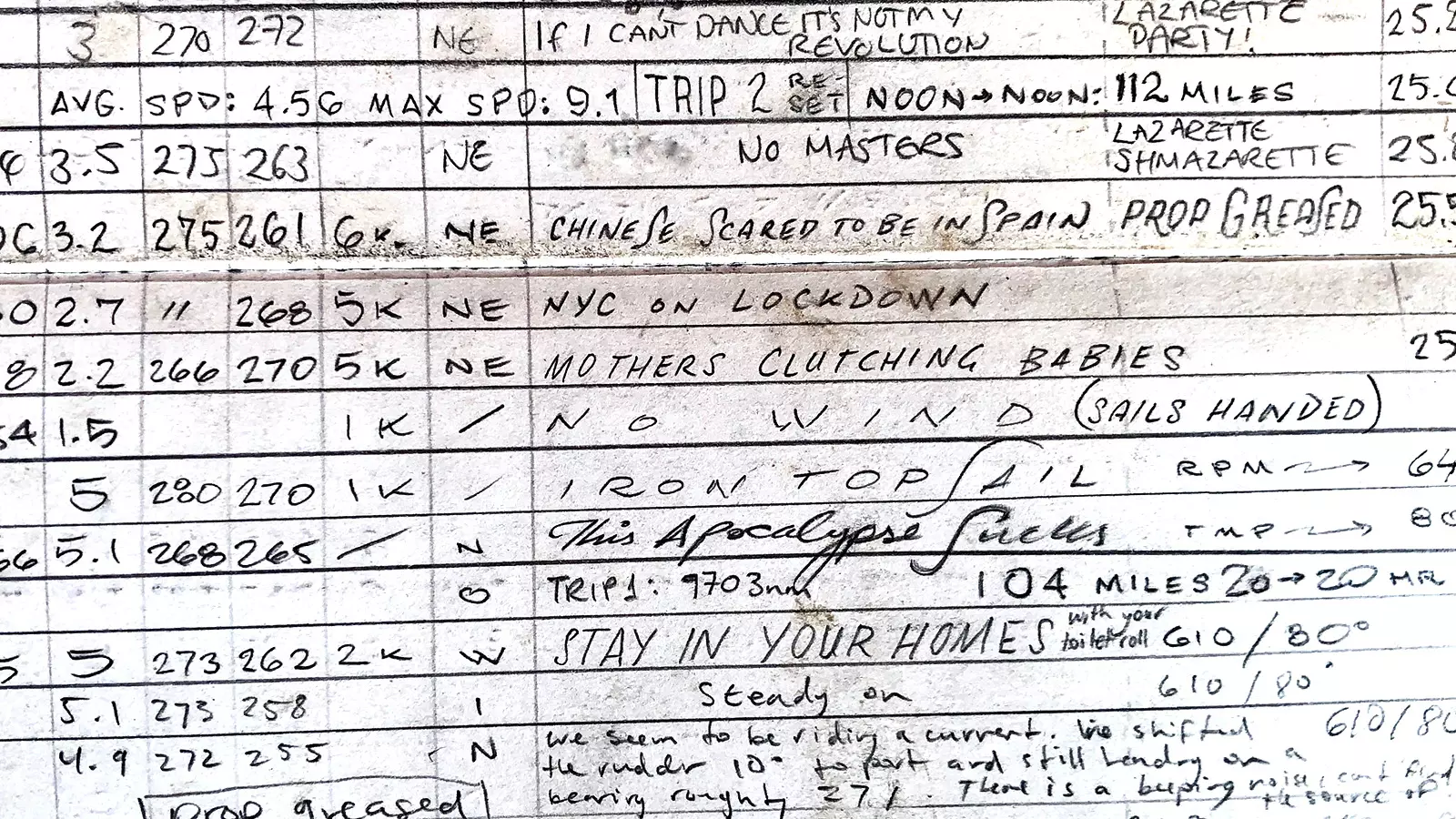
- Home
- India
- World
- Premium
- THE FEDERAL SPECIAL
- Analysis
- States
- Perspective
- Videos
- Sports
- Education
- Entertainment
- Elections
- Features
- Health
- Business
- Series
- In memoriam: Sheikh Mujibur Rahman
- Bishnoi's Men
- NEET TANGLE
- Economy Series
- Earth Day
- Kashmir’s Frozen Turbulence
- India@75
- The legend of Ramjanmabhoomi
- Liberalisation@30
- How to tame a dragon
- Celebrating biodiversity
- Farm Matters
- 50 days of solitude
- Bringing Migrants Home
- Budget 2020
- Jharkhand Votes
- The Federal Investigates
- The Federal Impact
- Vanishing Sand
- Gandhi @ 150
- Andhra Today
- Field report
- Operation Gulmarg
- Pandemic @1 Mn in India
- The Federal Year-End
- The Zero Year
- Science
- Brand studio
- Newsletter
- Elections 2024
- Events
Storms, doldrums and a squadron of giant manta rays: Tale of an ongoing voyage to promote resilience to climate change

More than 60,000 nautical miles and 25 countries from the tropics towards both poles… that’s the distance that Arka Kinari, a 70-tonne relaunched schooner, has covered so far since she started her journey five years ago. Ships are supposed to cover long distances, and what’s new in it? Yes, but there is something unique about this ship and its voyage. Launched by...
More than 60,000 nautical miles and 25 countries from the tropics towards both poles… that’s the distance that Arka Kinari, a 70-tonne relaunched schooner, has covered so far since she started her journey five years ago. Ships are supposed to cover long distances, and what’s new in it? Yes, but there is something unique about this ship and its voyage. Launched by US-born percussionist-artist Grey Filastine and Nova Ruth, an Indonesian vocalist-environmentalist, Arka Kinari is a floating cultural platform, and it sails for a cause.
A crew of seven, led by the duo, has been on a voyage to promote resilience to climate change and re-engagement with the sea since they began their journey in the Netherland’s famous port town Rotterdam in 2019. Arka means vessel in Latin and the Sanskrit word Kinari stands for a half-human, half-bird musician, guardian of the tree of life. A day onboard Arka Kinari begins with workshops, skill shares, and small concerts by local musicians. By night it transforms into a stage for the performance by Filastine and Nova, using music to sound the alarm for climate change and cinematic visuals to imagine life after the carbon economy. Traveling by wind and currents, Arka Kinari spreads its message of ecological sustainability and a carbon-free lifestyle.

Arka Kinari in front of the Sydney Opera House.
The maritime network, according to Filastine and Nova, was the original internet, mixing peoples, languages, and ideas. Arka Kinari revives disappearing trade-routes with culture as the cargo to people back to their waterfronts. The ship’s maiden voyage stopped in 23 nations, crossing the Atlantic, Caribbean, and Panama Canal, before being trapped in the Pacific Ocean for months during the pandemic. Currently docked in Indonesia, the ship will journey to Venice via historic trade routes soon. Arka Kinari will dock at the Cochin Port on its way to the Middle East in December 2025.
It has been five years and the journey is on. A week ago, Grey Filastine was in Kochi to share his experience of the ongoing voyage. Unlike many other ships, there are no fixed rules and regulations onboard Arka Kinari. It doesn’t make much difference between dawn and dusk. “We are usually a crew of 6-8 onboard. While at sea, there isn’t a clear hour which divides one day from another, because we work on continuous rotation,” said Filastine. “For example, I might be awake 4-6am for a solo night watch at the helm, then, if the sea isn’t too wild, I follow that with some writing or musical work, then rest again, then start my long afternoon shift from 2pm-10pm. During that shift, I’ll steer the ship, watch for hazards, trim the sails, and do minor repairs,” he added.
Arka Kinari is currently touring her home waters of the Indonesian archipelago. In each port, the ship transforms into a stage for an audiovisual performance by Filastine and Nova, as well as hosting workshops, talks, and concerts by local musicians. “In port each day is a new adventure, determined by our location and intentions. I usually wake two hours before the rest of the crew, paddle the dinghy to shore to take our dog for a morning walk, then return and make plans for the day, so that I’ve already got a plan ready for our 8am meeting,” said Filastine, who is co-founder, artist, deckhand and occasional captain at Arka Kinari.
In the beginning of the voyage, the crew faced a pandemic-imposed lockdown. The countries were closing their ports and borders and in the case of Filasine and his friends, it happened when they were in the Pacific ocean. They were literally caught between the devil and the deep sea, facing shortage of food essential commodities. On the North Coast of Hawaii, a squadron of giant manta rays circled their ship late at night. Their intentions were, however, ‘friendly’. A Chinese ship once helped them with food, vegetables and fuel to start the engine of the ship during the doldrums.
“Sometimes your engine malfunctions and unexpectedly burns up all the fuel, sometimes that happens exactly when you most need it, while crossing the doldrums in the empty regions of the western Pacific,” Filastine once said while asked about the challenges that he faced during the lockdown. Even though the ship moves using the natural forces of wind and current, it maintains a fuel-supported engine to maneuver in the doldrums and other unexpected hurdles.

Grey Filastine and Nova Ruth performing on AK in Bali.
The miserable experience, however, helped the team regain confidence. But for Filastine, it is a sense of fluidity which makes them move. “There is no such thing as stillness on a boat, between the waves, the wind and the currents there is perpetual movement,” he said. Different ports, different people. Has he been able to evoke a sense of response from people when it comes to ecological sustainability, climate change and carbon-free lifestyle? “At this point anyone with any sense at all understands that the climate is changing. The question is what can we, as individuals, do about it? This is the most difficult problem humanity has ever faced, a problem that touches every part of our life: food, energy, transportation, and ranges in scale from international treaties down to the smallest personal decisions. The response to Arka Kinari has been positive, because the project connects the past to the future, using the very old idea of sailing ships, but for a futuristic purpose,” said Filastine, who lives in Barcelona, Spain. He sold one of his properties in the city to manage funds for the project, mainly for the 're-launch' of the old schooner. But that was not enough. The duo then took loans from the banks to continue their work. In 2022, the ship reached Jakarta. It took months of work to bring Arka Kinari there, but the crew couldn’t dock there due to port sedimentation. Another hurried hustle for an alternate location also fell apart as the port flooded because it was too low. “These are the complications of bringing a ship to the world’s fastest-sinking city,” he said.
You see speakers, woofers and amplifiers at the entrance hall of the ship. Guitars of various models and other percussion instruments hung from the canvas fence. Filastine and Eva are in a constant search of music, particularly the elements of folk as well as regional. They have a programme called “Laut Loud” (Loud Seas), wherein they seek out singular music from islands across the archipelago. “The curation ranges from traditional to experimental, the criteria is that the music should have a unique soul and be under-heard. These sessions are then shared online, are being compiled in a durable open-source archive, and have been featured in museum exhibits. We hope to create a few Laut Loud sessions in India,” said Filastine.
“Kanvas Mutiny” is another programme of the duo with the participation of the local artists that they meet at the respective ports. “The six sails (a tensile structure made of fabric or other membrane materials that uses wind power to propel sailing craft) were painted by artists from each of the six continents that the ship visited, in a process that brings artists onto the sea and into collaboration with coastal peoples. The completed works were exhibited independently from Arka Kinari’s voyage, reaching lands, contexts and spaces beyond the range of the mothership. With an emphasis on bringing the artists onboard as resident sailors, “Kanvas Mutiny” intertwines artists with the ship’s crew and coastal peoples of Arka Kinari’s Indonesian home waters.
For Filastine, India is a fascinating country. He first visited India 25 years ago and he sees a huge difference today when it comes to cultural coherence and the style of living. “Last time when I was in India, everything was far more difficult, but there was a certain visual and cultural coherence – only one brand of car, people mostly wore domestically-produced clothes, and the advertising signs were all hand-painted in a local vernacular style. The world has certainly flatted in the last 25 years, everywhere you go there is more commercialism and less idealism,” said Filastine, adding that, “Thankfully, India hasn’t been totally bulldozed by monoculture, and has maintained a vibrant soul.”
Although this is his first visit to Kerala, he once came down to Chennai to buy a kanjira (frame drum). “This is my first time in Kerala, because long ago I was focused on studying north indian percussion. I twice spent six months in Kolkata, Varanasi, and Rajasthan in the 1990’s. The only time I came to the south was to buy a kanjira in Chennai, which I never properly learned how to play, but which I still own, and sail with us on the ship,” he added.

News of the pandemic in the log book from Pacific crossing February 2020 by Grey Filastine.
Storms, doldrums, and some spectacular moonrises... From one port to the other, the journey continues. How far ? “Arka Kinari moves primarily by sail, so we’ll use the same methods that the spice traders innovated to bring goods from the Maluku (a province of Indonesia) to the Middle East, which brings us to the essential port of Kochi, of course. We’ll depart from the tip of Sumatra in December 2025, likely arriving in Kerala in January 2026. After Kochi, I'd like to organise a visit to Goa if we can find the right local allies there. After which we’ll sail for the Red Sea, and then use the Suez Canal to reach the Mediterranean. After more than five years at sea I’d like to finally go home to Barcelona,” he said. But Filastine doesn't seem to stop there. “After a winter of rest, maybe we’ll still have energy for a tour of the UK or Baltic countries?”, he said.
